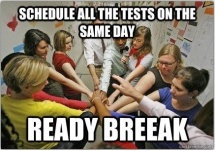Some of the smartest people I know are those that I am lucky enough to work with. Aside from being some of the most innovative teachers I’ve ever seen, they compose of authors, accomplished musicians, talented film makers, TEDx speakers, and many are also tremendous parents (those that aren’t, will be…should they so choose to have children). I could brag about them all day – I simply try my best to hold my place with them.
In my seven years of teaching, I have learned many things – but one risky thing I’ll say is this: The best teachers are those that talk about their students behind their backs.
We do…it’s true, but allow me to explain:
Yesterday, during my faculty’s research and development session, the topic of how we talk TO and how we talk ABOUT students came up in conversation. At the time, I was already about halfway through planning out this particular blog post, so it was funny that it was a topic of discussion. Anyway, I want to make it clear that it’s not gossip we’re spreading, insults we’re hurling, or laughter we’re enjoying (at the expense of the students) – they are genuine words of concern or praise. When students struggle, believe me when I say that the best teachers will immediately map out a plan for success. One of the ways this can be achieved is by conversing with colleagues. This can often come across as “griping,” but if we didn’t care, we wouldn’t bother. As Olivia says to Cesario (in Shakespeare’s Twelfth Night): “That’s a degree to love” (when she is told by Cesario that he pities her for loving him). In other words, feeling SOMETHING towards our students is much better than apathy. My point is this: the teachers that administration and parents need to worry about are those that don’t speak a word – saying nothing is lethargy and lethargy leads to apathy.
The assistance from my colleagues comes in the form of asking: What can I do? What else can I do? What happens when the student does this? You taught him/her last year, what strategies worked for you? What do you think would happen if I tried this?
By discussing students with my colleagues I provide hope for that student, I can construct strategies that may work, I illustrate that I care, and through all of the aforementioned, I make a better connection between myself and my students.
Talking about students behind their backs sounds negative, but it’s a degree to love (care). Inside the staff room is a sacred space (any teacher will tell you that) – sure, it’s a chance for some privacy/space from students, a chance for some fun lunchtime conversation, and even a chance to just relax from the noise of the hallway. The majority of the time, however, inside the staff room is when the planning happens and the deep conversations focused around student learning take place.
Don’t kid yourselves…we talk about students a heckuvalot…all in their best interest.
